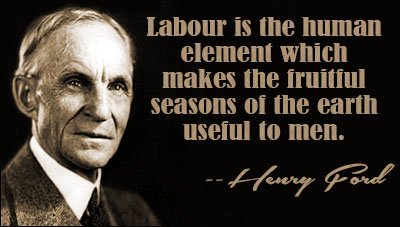

Henry Ford knew that good relations with the labor force were crucial. "As sales of his Model T boomed, Ford fretted that labour turnover and absenteeism would sap the efficiency of his assembly line production process. Paying higher wages was a way of attracting the kind of reliable workers who would keep Ford’s factories humming. ... Walmart’s move certainly took a page out of the old Henry Ford playbook. The company’s management sought to deflect criticism that it was underpaying workers — and with some success." Gary Silverman in The Financial Times.

There are a few reasons why Wal-Mart might be raising wages well above the federal minimum. It could be that the economy is stronger, there are fewer people looking for work, and Wal-Mart is competing with its rivals in order to keep the cash registers staffed. Another possibility is that Walmart is worried that unions will succeed in organizing if employees feel they're poorly compensated. These factors are interrelated, of course. Workers who are confident they'll be able to find another job are more willing to risk angering their bosses by organizing their colleagues.
One unexpected winner from Wal-Mart's decision: taxpayers, who chip in thousands of dollars a year in benefits for minimum-wage workers, according to a report from Democratic staff in the House of Representatives. For all the employees at a typical Wal-Mart Supercenter in Wisconsin, these costs likely total more than $900,000 annually.
These benefits are largely designed to sweeten the deal for people who are out of work and to encourage them to find a job. Now, Wal-Mart will assume more of the financial burden of making work pay, not taxpayers. So will the other retailers that will likely have to raise their wages in response, or see their workers quit for jobs at Wal-Mart.
1. Top story: Pigs reported flying as Wal-Mart raise wages sharply
The company will pay workers at least $10 an hour next year. "The new rate is 38% higher than the current federal minimum hourly wage of $7.25. 'Wal-Mart’s move to raise their employee pay base is a sign that the labor market has already tightened,' said Joel Naroff, chief economist at Naroff Economic Advisors. 'Their action could create a floor under wages and others may need to follow in order to retain and attract workers.' " Paul Ziobro and Eric Morath in The Wall Street Journal.
Let's hope the decision is the sign of an improving economy. "The best possible news would be if Walmart’s executives made this decision not out of a desire for good press or for a squishy sense of do-gooderism, but because coldhearted business strategy compelled it. ... The world for employers is very different with a 5.7 percent unemployment rate (the January level) than it was five years ago, at 9.8 percent. Finding qualified workers is harder for employers now than it was then, and their workers are at risk of jumping ship if they don’t receive pay increases or other improvements." Neil Irwin in The New York Times.
Wal-Mart representatives note that a lack of motivation among employees is costly for the company in several ways. "The retailer has realized that staff turnover was hurting its business, and it is willing to spend $1 billion this year on higher pay and more career opportunities to keep store workers in their jobs. ... A large body of research — some conducted decades ago by current Federal Reserve chairwoman Janet Yellen — suggests that raising wages leads to lower employee turnover and better customer service, which generally correlates with higher sales and lower expenses." Lauren Weber in The Wall Street Journal.
The company could also be anticipating an increase in the federal minimum. "For its part, Wal-Mart has stayed officially neutral on a proposed federal minimum wage hike. But if the company figures a higher standard is inevitable, it might as well get out in front of it. ... Doing so voluntarily — as well as giving employees more control over scheduling, another key demand of labor groups — potentially protects Wal-Mart from a greater threat: Labor organizing." Lydia DePillis in The Washington Post.


No comments:
Post a Comment